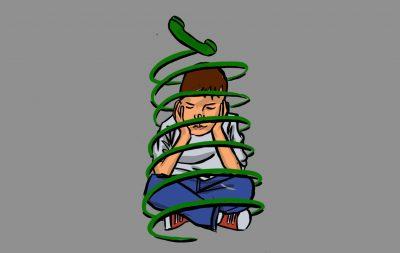Trigger warning: The following article discusses suicide.
Any discussion about suicide — whether through a Zoom class or a news article — is hastily followed by the distribution of the National Suicide Prevention Lifeline phone number: 1-800-273-TALK.
As most people already know, the NSPL provides 24/7 emotional support to people in distress and those considering suicide.
The lifeline is an incredibly important resource for people who need it, so much so that by 2022, the Federal Communications Commission will designate 988 as the nationwide emergency phone number for the NSPL.

My qualms with the hotline do not lie in its purpose but rather in the way we utilize it.
When we offer up the resource haphazardly in tricky situations, it becomes a communication barrier that screams, “I’m not obligated to take care of you because I expect this phone number will.”
Are we certain this hotline is the best resource at this particular time for this particular person? If we’re not certain — and most of us aren’t, since we’ve never called it — then we need to understand the phone number is not the fix-all we assume it is.
I’m not okay with the idea that the primary resource we provide for people struggling with suicidal thoughts is an emergency number. This gives the wrong idea that our lowest moments are the only times when people are available to help, which is vastly untrue.
There are multitudes of misperceptions that allow us to perceive the NSPL hotline as a standardized method of support that works for everyone.
Most people don’t know that the first voice you hear when calling the hotline is an automated one that proceeds to put you on hold.
Most callers wait for 30 seconds, sure, but 30 seconds of hearing absurd easy-listening music was certainly enough time for me to laugh and hang up the phone.

When the hotline fields your call, they also are required to give you this statement: “Your call may be monitored or recorded for quality assurance purposes.”
If you do manage to get support from the hotline — without hanging up from the daunting task — there isn’t evidence to prove the hotline can prevent suicide in the long term.
“You could say you saved lives,” said John Draper, the director of the NSPL, in an interview with Vice, “But by the same token, you don’t know if they’re going to be okay later.”
Ultimately, the NSPL is a necessary emergency number for those who need it, and I’m excited to see its convergence into a three-digit dial. But chances are the people who need it have already heard of the number — the decision is just in their hands on whether or not to call it.
When a close friend reaches out to you in a crisis, they’re not asking you to recite a series of numbers they’re already familiar with. They need your advice or your comfort. It wasn’t easy for them to confide in you, so don’t treat that lightly.
If you’re not ready for that conversation, that’s totally fine too. But you’re not off the hook yet. They reached out to you, so the onus is now on you to find another resource for that person — a resource they can truly trust, such as another close friend, a family member or maybe a therapist.
And if you trust the NSPL phone number as that resource, then that’s up to your discretion.
I only ask for everyone to help their friends build the best support network they can — because ultimately that’s one of the best suicide preventions there is.
























































































































Mitchell • Apr 9, 2021 at 4:24 pm
Preach it. The question is what can we do to change this.